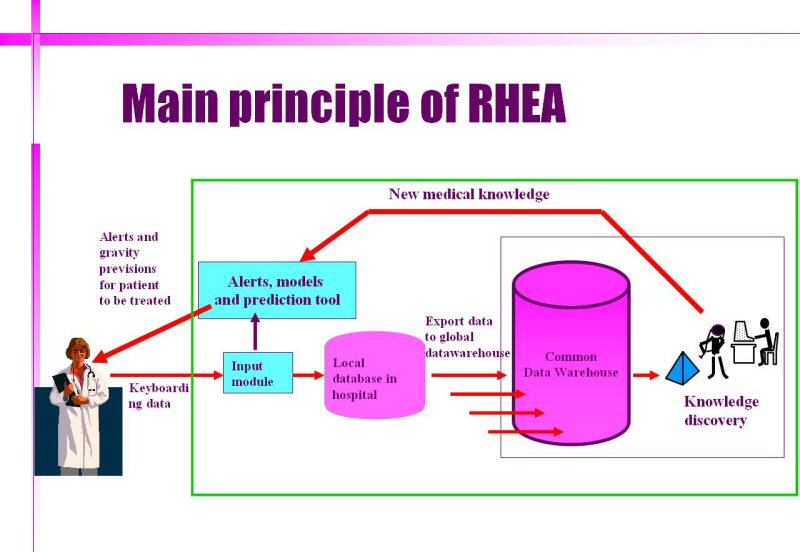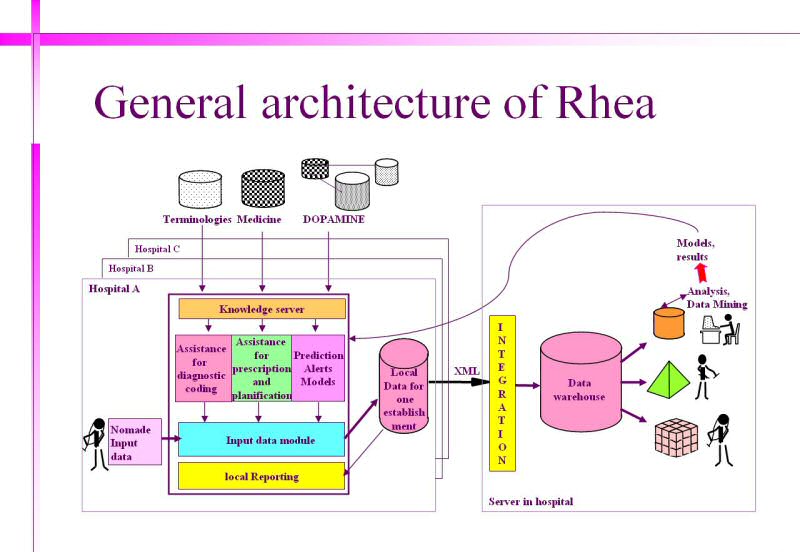|
Nowadays, no resource enables the clinician to predict the occurrence of nosocomial complications or the aggravation of the patients' situation in intensive care. However many indications are collected from the patient every day.
RHEA project's objective is the development of a decision-making aid tool, based on a data warehouse. The latter is supplied by a selective and anonymized extraction from local data bases of the intensive care centers. A biostatistical exploitation of the warehouse makes possible to highlight the correlations between the data, and thus, to specify tools of prediction on the seriousness evolution, considering the iatrogenic or nosocomial dangers.
The software of data entry allows the wandering data acquisition from the patient's bed, gives predictions of aggravation about this patient and provides assistances to the treatment prescriptions along with the acts encoding. It will also contribute to the daily forward planning of the nurse-related cares.

Principle of project RHÉA: a decisional chain also offering assistances to the daily control of the patients
The creation of data warehouses is an answer to the integration problem of a great quantity of diversified data, relating to a specific application field, and physically stored in various data sources. The data warehouse gathers, in an exploitable form, the information extracted from these sources and which are potentially relevant for one or another category of practitioners-researchers. At present, the use of handheld means of data entry, and the interconnection of production systems of numerical information assures an exhaustive data-gathering in the same place of their production (hospital bed of the patient, room of consultation or operation).

The data warehouse lies at the heart of the decisional system: it will make possible to command a stock of cleaned, integrated and historized medical data. Highly complicated requests will find answers with this data source (for example, to seek the molecule having had the greatest positive impact on a symptom, with a negative impact on another symptom not exceeding such duration) or they could search for unknown correlations between several data (for example, relations of cause and effect between two pathologies, even if the correlated events occurred with an interval of time). The analysis of the data has two principal aims: to establish the models of seriousness evolution which will be used by the prediction software related with the data acquisition of the patient, and, in addition, with specific studies at one of the practitioners' request, for example on the cardiovascular symptoms (those constitute an important cause of admission: 23% per shock and SDMV on 9 centers in France in 2000/2001).
The other basic idea of project RHEA is to combine functionalities of assistances to management - prescriptions, diagnostics, cares, stays, codings PMSI - in the decisional chain. Indeed, to entry the data corresponding to each stay is certainly a task necessary for the decisional warehouse supply and the final scientific study, but it's also a long and tiresome labor. So, the idea is to make profitable the effort made for the seizure to a maximum for the center. Beyond the quite important contribution brought by a replacement of the daily and obligatory manual seizures on sheets of paper, this data entry will be integrated in a software offering the following assistances: • a module of assistance for cares prescription,
• a module of assistance for forward planning of the nurse-related cares,
• a module of assistance for stays codings PMSI.
Getting advantage from scientific results acquired by data mining on the warehouse, the soft supplies also:
• a module of assistance for prediction on the seriousness evolution of the patient health,
• a warning module in case of particular danger for the patient.
The fact that data entries feed an hospital local database (remind that the database isn't corrupted by the selective and anonymized exportation of the data to the warehouse) enables:
• a data mining module on the local database,
• a reporting module on the local database. |